Section 9: LITVAK FORUM
|
|
|
|
|
|
|
|
|
|
|
|
|
|
|
|
|
|
|
|
|
|
|

THE VOICE OF INTERNATIONAL LITHUANIA
|
VilNews has its own Google archive! Type a word in the above search box to find any article.
You can also follow us on Facebook. We have two different pages. Click to open and join.
|
Fri, 23rd September, 2011 - Posted by - (2) Comment
Because of the Jewish Holocaust during the Second World War Lithuania lost over 90 per cent of the Jewish community. In 1994, 23 September was declared National Memorial Day for the Genocide Victims of the Lithuanian Jews to commemorate the liquidation of the Vilnius Ghetto on that day in 1943. Many events are held to commemorate 23 September in different institutions of Lithuania every year. |
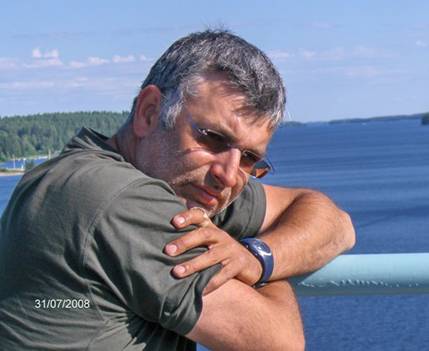
Sergejus Kanovičius
OPINION: By Sergejus Kanovičius
Very recently I looked at the Delfi.lt webpage and could barely hold back the tears watching one of the episodes of Mission Siberia (http://tv.delfi.lt/video/ST5zL0DJ) which aired this year, an interview with Lithuanians who have lived [in Siberia] eight decades now, unable to speak Lithuanian and explaining why they who have lived their entire lives in Siberia see no sense nor opportunity to return to Lithuania…I was saddened because of the tragedy of their lives, but at the same time I was glad that they are alive and healthy.
I remember how one of my best friends, the poet Liudvikas Jakimavicius, used to tell me during long evenings at his farm about the oppressions his family experienced, how his parents shared one cattle wagon with a Jewish boy named Harry, whom everyone called Garik. How Joske who spent the years of exile together with Liudvikas’s family, always used to send packages from far-off Israel with instant coffee and other items unavailable in the dying Soviet empire.
I told Liudvikas about my almost completely butchered family. It was painful for both of us, we empathized with one another and tried to understand the other’s pain and shared our grief until his pain and heartbreak became my pain, and the suffering he and his family experienced became mine as well.
Sat, 10th September, 2011 - Posted by - (1) Comment
an interview of Myra Sklarew
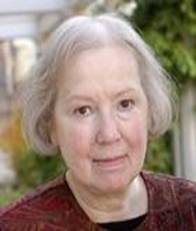
By Ellen Cassedy
ellen@ellencassedy.com
Myra Sklarew is the author of numerous books of poetry, including The Witness Trees, a powerful account of how she forged – and is still forging – a connection to her Jewish heritage in Lithuania. VilNews correspondent Ellen Cassedy spoke with Sklarew in Washington, D.C.
Myra, you have visited Lithuania twelve times in 18 years. What first drew you to the land of your ancestors?
In 1993, it occurred to me that with the end of the Soviet occupation, I could walk freely. I went with no knowledge. I didn’t know a soul and didn’t know the language. I just started walking.

Let’s listen to how you put it in The Witness Trees, your book-length poem with a Yiddish translation by the noted late Yiddish poet David Wolpe (a member of your Lithuanian Jewish family who immigrated to South Africa):
I wanted to go there
by feel, to see if Lithuania would tell me
its secrets, to see if I would
recognize myself in Lithuania, to marry the myth
of who I am with the myth of place. To find more
than the signs of the dead. To find evidence
of the lives of those I have come from.
Wed, 13th July, 2011 - Posted by - (3) Comment
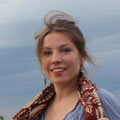
I am Ieva – the producer of the project
“Phenomenon of Civilization: Jews, Litvakes, Lithuanian Jews”.
Letter from Ieva Sabaliauskaite, United Kingdom
Only with the awaken memory the nation can preserve its history. Our Lithuanian history has deep imprints of Jews, who made this country flourish through their sincere spirit and unique approach to religion, culture, education and economics. Now they are undeservedly out of our memories… Our project aims to enlighten today’s society about great achievements and unique culture of Jews’ in our country and in the whole world.
Since the Middle Ages the Grand Duchy of Lithuania had been a safe place for Jews from wild anti-Semitism that was burning in neighbouring countries. With granted special rights, the Litvakes – Jews of Grand Duchy of Lithuania - were allowed to reach a degree of prosperity unknown to their Polish and German co-religionists at that time. Litvakes were settled in Stetls – towns there Jews made up a significant proportion of the population. Majority of cities’ businesses and factories belonged to them. Those cities had particular coloration of Jews’ spirit, but now it’s impossible to find a single living sign of Jews apart of signs to genocides places.
Litvakes had massively emigrated from Lithuania, and from those who stayed, only a few thousands have left. But there were over the million of them scattered throughout the world and most of them never forgot their roots. Their unique approach to life is being passed through generations, giving births to new talents and achievements. In fact, Litvakes are distinguished in the whole world in various fields. There are many Nobel Prize winners, art, music, politics, cinema and literary stars, such as Bob Dylan, Leonard Cohen, Michael Douglas and numerous other Litvakes. The name of Vilna Gaon is known to all, even to little educated Jews, as well as to other nations’ people. Litvakes are considered as the elite of Jews. What is the reason of this phenomenon? To discover that, we must take a look at a picture of Jews in general.
Astonishing facts prove their greater brilliance comparing to other nations: although Jews constitute only about 0.2% of the world’s population, they won 29% of the Nobel Prizes in literature, medicine, physics and chemistry in the second half of the 20th century. So far this century, the figure is 32%. The extraordinarily high proportion of Jews in such fields as medicine, law, finance, literature, science, creative arts and the media is as obvious as it is devastating.
Maybe Jews really are “God’s Chosen People”? Or does a distinction of Jews lie in their religious roots? Maybe Jews’ traditionally responsible approach to progeny and education is a cornerstone of their huge talent? Or could it be that those prosecutions and genocides caused exclusive development of Jews’ intellect? Or is there rather freedom and granted special rights that is a reason of Jew's great intellectual and cultural development?
Our project seeks to reveal the superiority of Jews and to bring back to our memories the forgotten Litvakes’ contribution. Our website http://litvaks-lithuanian-jewish.com . Litvakes. Lithuanian Jews.is created to collect any kind of information about Jew’s lives in Lithuania. With collected information we intent to shoot a TV documentary scrutinizing Litvakes issue in the context of all Jewish community, while capturing interpretations of various fields’ experts, as well as interviewing famous Litvakes and illustrating that with documentary material about them: their mores, religious and cultural traditions, their lives in Stetls, etc.
We are strongly motivated to awake this sleeping history realm of Jews in Lithuania, so that the memory of us becomes alive and universal, but not selective, not judging, not stereotyped. Your comprehensive contribution is invaluable to us: your ideological support, any kind of historical material you could share. We would be thankful for anything that could support this project. Please join us on http://litvaks-lithuanian-jewish.com/forum/ and on our Facebook Page http://www.facebook.com/Jews.Litvakes.LithuanianJews
Phenomenon of Civilization: Jews, Litvakes, Lithuanian Jews. Be part of us! We are waiting for your suggestions and comments!…
Wed, 22nd June, 2011 - Posted by - (1) Comment
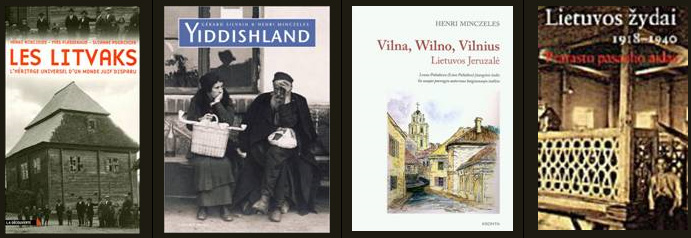
Lithuania's parliament (Seimas) on Tuesday approved the decision to pay 128 million litas (over 37 million euros) in the next 10 years to compensate Jewish people for their property alienated by totalitarian regimes.
82 MPs voted for the adoption of bill on Good Will Compensation for Real Estate of Jewish Religious Communities, 7 were against and 16 members of the Lithuanian parliament abstained.
The compensation will be paid in 2013-2023 and used for religious, cultural, health, sports, educational and scientific goals of Lithuanians Jews in Lithuania. A one-off sum of 3 million litas will have to be used to support people of Jewish nationality who lived in Lithuania and suffered from totalitarian regimes during the period of occupation.
Under the adopted bill, the compensation will be transferred to a special fund the governing body of which would represent the Jewish Community in Lithuania, the Religious Jewish Community of Lithuania and other Jewish religious, health, cultural and education organizations.
Wed, 22nd June, 2011 - Posted by - (1) Comment
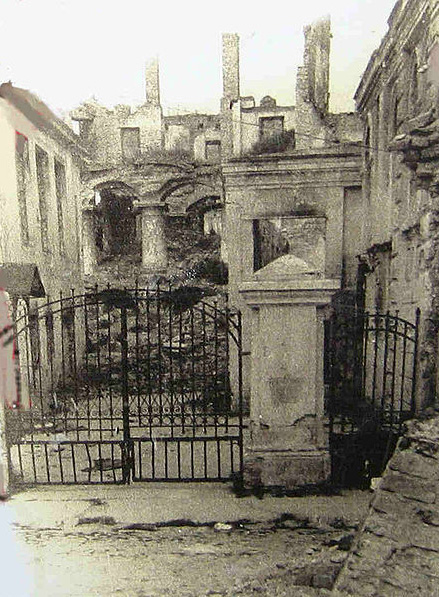
The Great Synagogue in Vilnius was partly destroyed by the Germans during World War II. The ruined synagogue and the whole “schulhof” complex which had grown around it were demolished by the Soviet authorities from 1955 to 1957 and were intentionally replaced by a basketball court and a kindergarten to effectively prevent any future initiatives to rebuild a cultural monument.
With a view to perpetuating the memory of the former Jewish spiritual and cultural center – the Great Synagogue of Vilnius – a historical archaeological excavation of the site has been launched. The exploration team led by archaeologist Zenonas Baubonis is ready to embark on the exploration of the site of the former Jewish house of worship at Vokiečių Street 13A. This work is expected to be completed by September so that the elementary school of Vytė Nemunėlis, which happens to be in territory of the former Synagogue, could start on time.
Fri, 10th June, 2011 - Posted by - (0) Comment
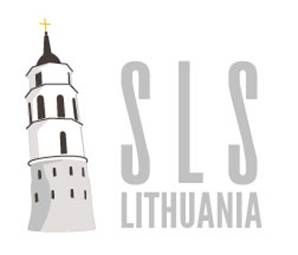 The global organization “Summer Literary Seminars (SLS)” is coming to Lithuania this summer!
The global organization “Summer Literary Seminars (SLS)” is coming to Lithuania this summer!SLS Lithuania 2011 will take place in Vilnius, a welcoming European capital with a rich and diverse linguistic and literary heritage. The city has produced, or been haven and home to, some of the major figures of Lithuanian, Slavic, and Yiddish literature.
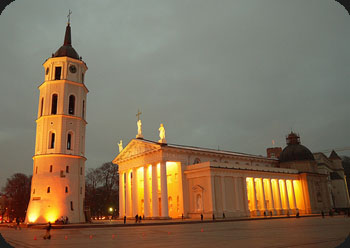 Vilnius is the perfect backdrop for a literary seminar. As a cultural crossroads over the centuries it has a rich and multi-layered past, which is reflected in the city’s varied architecture and intriguing residents. More importantly for SLS, Vilnius is not a city-museum but a city with a bright future and a rich, if at times troubled, past. From a purely practical vantage point, it's compact and walkable, and it offers all of the conveniences of a global city, albeit with its own idiosyncratic twists. An inspiration for any artist.
Vilnius is the perfect backdrop for a literary seminar. As a cultural crossroads over the centuries it has a rich and multi-layered past, which is reflected in the city’s varied architecture and intriguing residents. More importantly for SLS, Vilnius is not a city-museum but a city with a bright future and a rich, if at times troubled, past. From a purely practical vantage point, it's compact and walkable, and it offers all of the conveniences of a global city, albeit with its own idiosyncratic twists. An inspiration for any artist.
In addition to intensive daytime workshops taught by leading North American writers, participants in this unique two-week seminar will get a creative charge from the engagement with this refreshing and vibrant cultural milieu.
SLS offers much more than a mere change of scenery. Participants and faculty spend more time together outside of the classroom than in most summer literary programs.
In Lithuania, participants will also get to meet and socialize with fringe and mainstream artists from a different culture. And they get first-hand exposure to a lifestyle in flux -- one melding the absurdities of the Soviet past, the contradictions of the (East) European present, and the strivings of a feisty, innovative little land on the coast of the Baltic Sea.
Also, for its edition, SLS Lithuania will join in celebrations marking the centenary of the birth of the poet and 1980 Nobel laureate Czeslaw Milosz, who lived and studied in Vilnius before World War Two. He eventually settled in the United States and lectured at U.C. Berkeley for many years. SLS has invited faculty who were friends of this giant of twentieth century literature during his American years to join us in Vilnius.
In partnership with the Litvak Studies Institute, SLS will reprise the fascinating ‘Jewish Lithuania’ stream. The program is an intensive two-week exploration of Vilnius's (or if you prefer, Vilne's) rich Jewish past.
Summers are short in this corner of Northern Europe, which is why street life in Vilnius is lived to the hilt in August, when the days are long and the nights are short. Outdoor cafes, cozy courtyard bistros and cool cellar taprooms abound in Old Town -- prices are dramatically lower than in the big tourism hubs. And there are more winding streets, cobblestones, archways, bell towers, bridges, spires, steeples, and leafy parks with ancient oaks in Vilnius than you can aim a camera at. Come join us for the experience of a lifetime, a literary journey like no other.
Please feel free to direct any questions you may have to: info@litvakstudiesinstitute.org.
Seminars
Morning Seminars
Fiction – Joseph Kertes
Poetry – Edward Hirsch
Mixed Genre – Robin Hemley
Poetry & Translation – Kerry Shawn Keys
Afternoon Seminars
Fiction – Josip Novakovich
Poetry – Rebecca Seiferle
Laimis Briedis – “Vilnius: City of Strangers” Walking Tour
Jewish Lithuania:Litvak Experiences Option
SLS Lithuania June 31 - August 13, 2011
Click here for more information on SLS Lithuania
Tue, 3rd May, 2011 - Posted by - (1) Comment
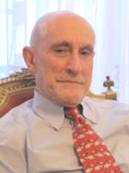
By Yves Plasseraud, Paris
A series of painful and worrying events (Stankeras holocaust denial, Vilnius neo-nazi parade, desacration of the 9th Fort Memorial… the list is sadly long) have recently drawn the attention of Western intellectual and journalists towards what seems to be a substantial increase of antisemitism in Lithuania. The name of Lithuania, associated for centuries (during the period of the Grand Duchy of Lithuania particularly) with the idea of tolerance and social peace, is now more and more being seen as synonym of antisemitism, racism, xenophobia and, another field, homophobia. For many observers, Lithuania is now leading the group of “small” countries where human Rights principles appear forgotten !
There is obviously some exaggeration in this perception, but the recent evolution of Lithuania’s public opinion remains indeed worrying. What happened to this country ? Let’s first try to determine if there are specific causes in the Lithuanian case, and, in the affirmative, what is their nature.
It does not seem to be the experience of World War Two of extensive collaboration with the Nazis and participation to the Holocaust. Countries like Latvia, Moldova or Ukraine share the same terrible memories. It can hardly be the current xenophobia, it is much worse in a country like neighboring Russia. Obliteration of the Holocaust responsibilities seems more obvious in Latvia or in Moldova than in Lithuania. In these conditions, what can be the specificity of the Lithuanian problem?
Sat, 9th April, 2011 - Posted by - (1) Comment
By Ellen Cassedy

The Jewish cemetery in Rokiskis, where Ellen Cassedy found the gravestone
belonging to her great-grandfather, Dovid-Mikhl Levin.
When I traveled to Rokiskis (Rakishok), the town where I trace my Jewish roots, I was seeking to imagine a way of life long gone. I filled my eyes with the fields and the sky, the brightly painted wooden houses and the muddy vegetable patches, the market square and the gracious expanse of the count’s estate.
And I visited the old Jewish cemetery on the edge of town. The grassy paths were clogged with nettles and blackberry vines. Some headstones had fallen face down into the earth, and many were too deteriorated to be readable. But it was not long before I found the gravestone inscribed with the name of my great-grandfather, Dovid-Mikhl Levin.
As I knelt down and traced the moss-covered Hebrew letters, I felt the satisfaction of offering respect to my forebears. In return, I felt a kind of blessing coming from them to me.
Wed, 19th January, 2011 - Posted by - (5) Comment

A new book by the famous French-Litvak writer, Henri Minceles, has recently been published.
“Le mouvement ouvrier juif. Récit des origines (The Jewish Workers Movement. Story of the Origins)”
Éditions Syllepse, Collection Yiddishland, Paris, 2010.
| Other books by Henry Minczeles As single author or co-author |
 |
Tue, 18th January, 2011 - Posted by - (5) Comment
Three African Governments – Liberia, Sierra Leona and Gambia – are these days coordinating a combined honouring of twelve Litvaks who through two centuries have done outstandingly much to help their African homelands and their peoples. They release these honours publicly as a completely new stamp issue now in March 2011. The stamp issue acknowledges the extraordinary sacrifices made by Jews to the liberation of their African brethren, and these stamps recognize some of the most significant contributors to global humanity in the 20th Century. These are five of the persons being honoured:
|
Helen Suzman (nee Gavronsky) was born in the South African mining town of Germiston on 7 November 1917 to Samuel and Frieda Gavronsky, both immigrants from Lithuania who had come to South Africa to escape the restrictions imposed on Jews. |
Esther Barsel (born October 17, 1924, in Raguva, Lithuania; died October 6, 2008, in Johannesburg) was a South African politician and long-standing member of the South African Communist Party (SACP). She was a member of both her local African National Congress branch and the SACP's Johannesburg Central Branch |
Yetta Barenblatt was born on 24 September 1913, in Dublin, Ireland, to Basna and Solomon Malamed of Lithuanian origin. In 1925, a friend encouraged her to come to South Africa with the promise of employment. However, due to her circumstances, further education was not possible and Barenblatt was forced to seek employment at a retail store. |
Norma Kitson was one of a generation of Jewish activists, who committed themselves to the struggle against racial tyranny in South Africa. The drive of these South African Jews was to give witness against racism and social injustice, even at great personal cost. Norma Kitson's autobiography, Where Sixpence Lives (1986), uniquely fuses the personal and the political. |
Ruth First was born on May 4, 1925 to Jewish immigrants Julius and Matilda First. Julius, a furniture manufacturer, was born in Latvia and came to South Africa in 1906. He and his wife were founder members of the Communist Party of South Africa (CPSA) or South African Communist Party (SACP) in 1921 . Ruth and her brother, Ronald, grew up in a household in which intense political debate between people of all races and classes was always present. |
Fri, 7th January, 2011 - Posted by - (14) Comment
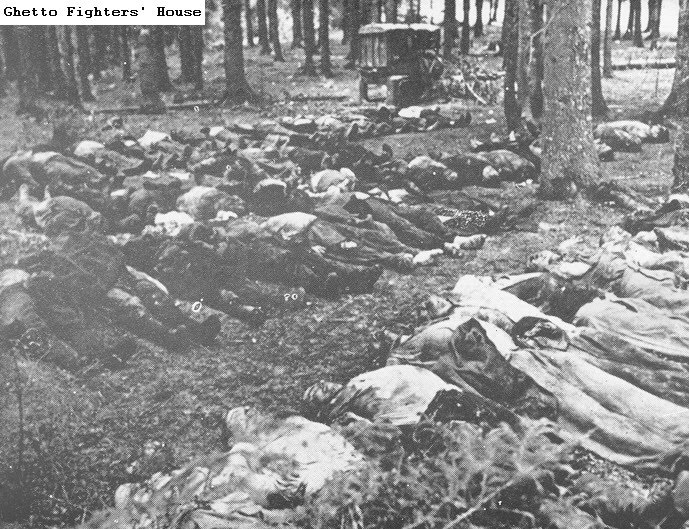
Corpses exhumed from mass graves at the Paneriai (Ponary) mass extermination site near Vilnius.
The Holocaust in Nazi-occupied Lithuania resulted in the near total destruction of Lithuanian Jews living in the Nazi-controlled Lithuanian territories. Out of approximately 208,000 to 210,000 Jews, an estimated 195,000–196,000 were murdered before the end of World War II (wider estimates are sometimes published); most between June and December 1941. The Holocaust resulted in the largest ever loss of life in so short a space of time in the History of Lithuania.
Fri, 7th January, 2011 - Posted by - (1) Comment
 Vilnius was like a Mediterranean city!
Vilnius was like a Mediterranean city!“Vilnius was like a Mediterranean city, and Lithuania before Holocaust was a society of love, full of colourful life and warm interaction between people. Imagine that here, in the street we are sitting, the windows would now be open, the mothers would be shouting to their children, and the street would be filled with joyful people discussing, singing, reading and mingling in a happy crowd of friends, colleagues and visitors.” Emmanuel Zingeris gets tears in his eyes when he tells me about pre-war Vilnius.
Fri, 7th January, 2011 - Posted by - (0) Comment
|
|
|
Zhydu (Jewish) street |
A widespread saying had it - if one wants to do business, one has to go to Lodz, but if one wants to gain wisdom - one goes to Vilnius.
The first document mentioning Jews in Vilnius dates back to 1567. At that time Jews did not have the right to purchase houses in the city, they could only rent them. Jews gained the right to own buildings in Vilnius only in 1593. Before that, they were allowed to reside in the lands which did not belong to the magistrate, so called jurisdiks. At the end of 16th - beginning of 17th centuries they were allowed to inhabit Zhydų (Jewish), Šv. Mykolo (Saint Michael's), and Mėsinių (Butchers') streets. They could also live on Vokiečių (German) street, but the windows of their apartments could not face the street.
|
|
|
Entrance to the Jewish quarter |
The Jewish quarter was formed in the Old Town. According to 1784 census there were around 5,000 Jews in Vilnius at that time; according to 1897 census Jews constituted 38.8% of town's population (64,000 Jews). After WWI their number somewhat decreased, and in 1923 only 55,000 Jews lived here (33.3% of the population), and on the eve of WWII, in 1939, Jews made up 27.9% of the population, which then was around 60,000 people.
In the 18th century the great genius Gaon of Vilna emerged. Since then Vilnius became a recognized spiritual center called Jerusalem of the North. There are several versions of the story why Vilnius was so exceptional. One of them says that there were 333 scholars in the town who knew the whole Talmud by heart.
But this is only a legend. The fact is that before the Catastrophe Vilnius indeed was the most honoured centre of Judaic culture. On the eve of WWII there were over 100 synagogues and 10 yeshivas, the most famous among them - the Ramaile yeshiva, in Vilnius. The world recognition of Vilnius is testified by the dream of the hero of the story "If I were Rotshild" by the great Yiddish writer Sholom Aleichem. The dream is to establish a huge charity organisation, which would provide work for all Jews, everyone would live in peace and study Talmud in yeshivas. And above all yeshivas there would be the chief one, "of course, in Vilnius".
Fri, 7th January, 2011 - Posted by - (0) Comment
Text: Linda Cantor (USA) http://www.shtetlinks.jewishgen.org/kupiskis/kupishok.htm
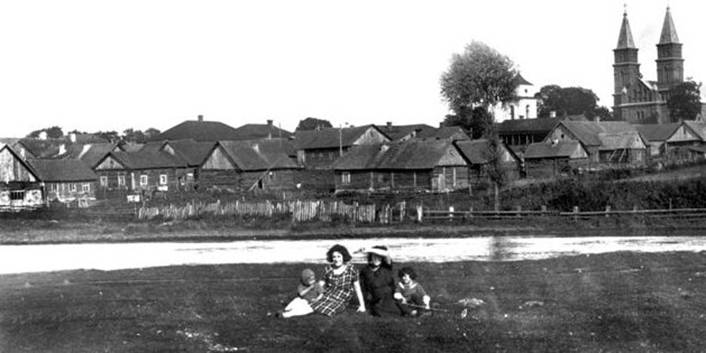
The Uzpaliai ‘shtetl’ in the 1920’s
“Shtetl” is the Yiddish word for small town, the type of community that many of our Eastern European ancestors lived in for centuries before either emigrating or being killed during the Holocaust. Under the aegis of JewishGen, Inc. and its ShtetLinks project (http://www.shtetlinks.jewishgen.org/), genealogists are able to memorialize the shtetl that their families came from. For me this is a wonderful way to honor not only my grandparents who grew up in these communities but also all those who came before them. It’s a way to remember the Jewish communities of Eastern Europe that no longer exist -- the people, the culture, and the institutions.
I maintain three Shtet Links sites for the Lithuanian towns of Kupiskis, Rokiskis, and Uzpaliai. My father’s parents were born in Kupiskis and Uzpaliai and many family members lived in Rokiskis. After a visit to these towns with my father, I decided that I wanted a more permanent way of honoring my family and all their neighbors and so I started my websites. But while I maintain them, the content is a result of a huge group effort. Photos and information were shared by survivors and descendants of people from these towns. I have tried to recreate the communities that existed in the past through family stories, family photos, and archival and historical records.
There are over 400 ShtetLinks sites that cover eastern and western Europe, as well as the rest of the globe. The creators are all volunteers who are doing this as a way to commemorate their family pasts. In essence, we are writing the history of our families and their communities.…
Fri, 7th January, 2011 - Posted by - (4) Comment
What do Ben Bernanke, the head of the Federal Reserve leading the United States to economic recovery; one of the most-famous American singers of all time, Bob Dylan; the rocker Pink; British comedian Sacha Baron Cohen and French philosopher Emmanuel Levinas all have in common?
All these people have roots in Lithuania. As do hundreds of thousands, or perhaps even millions, of Jews around the world, whose parents were driven from our country by the Tsar’s restrictions, fellow Lithuanians withdrawn into a closed farming culture and the mass murder organized by the Nazis in World War II.
What would Lithuania look like now as we enter the second decade of the 21st century, if almost all Lithuanian Jews had not been exterminated during the last century?
Thu, 6th January, 2011 - Posted by - (3) Comment

The Jewish Museum in Cape Town is more Lithuanian than Lithuania itself.
It is considered that around 90% of the approximately 80,000 Jews living in South Africa are of Lithuanian descent (the so-called Litvaks), which thus constitutes the largest pocket of Litvaks in the world! You are hereby invited to learn more about this unique Jewish community that still holds Lithuania alive in their hearts, museums and synagogues.
The Jewish Museum in Cape Town offers visitors a journey back in time. Most museums do. The striking feature of this museum, however, is that the journey to the past also brings us to a completely different part of our world, from Africa's southern tip to a seemingly modest little country far to the north, to a country where around 90% of South Africa's Jewish population has its roots (there are today about 80,000 Jews in South Africa).
The museum's basement is dominated by a village environment (shtetl) from the late 1800s. A few houses are reconstructed in full scale, and you can clearly see how people lived and co-existed at the time. The village is called Riteve. It was recreated in the museum on the basis of entries made in the 1990s by a group of experts who went from South Africa to Lithuania to find traces of the family of the museum's founder, Mendel Kaplan.
The village is called Rietavas in Lithuanian. It is there to this day, less than a half hour drive from Klaipeda, at the highway direction Kaunas and Vilnius. The Kaplan family emigrated from here in the 1920s, while the village's population was still 90% Jewish. Today, no Jews live in Rietavas.
A stroll among the house-models in the Cape Town museum’s basement is like walking around in a part of Lithuania, almost more Lithuanian than Lithuania itself. This impression is becoming no less strong when I discover that the café that is a part of this comprehensive Jewish complex in Cape Town, is also named after the founder’s home town in Lithuania, and that the older part of the museum is a replica of a Vilnius synagogue. This synagogue was built in 1863, and was the first ever built in South Africa.
VilNews e-magazine is published in Vilnius, Lithuania. Editor-in-Chief: Mr. Aage Myhre. Inquires to the editors: editor@VilNews.com.
Code of Ethics: See Section 2 – about VilNews. VilNews is not responsible for content on external links/web pages.
HOW TO ADVERTISE IN VILNEWS.
All content is copyrighted © 2011. UAB ‘VilNews’.